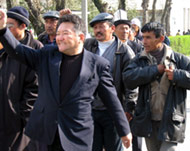Kyrgyz leader defiant after unrest
Kyrgyzstan’s president, facing violent protests in the south over a disputed election, has defiantly backed the poll as legitimate but ruled out a massive use of force to end the unrest.

Askar Akayev broke silence over the protests, in which opposition supporters have seized control of two southern towns, on Tuesday, telling newly elected deputies they were part of a body of “high and undisputed legitimacy”.
Dismissing the unrest as a “temporary phenomenon” by marginal opposition groups encouraged by unnamed foreign forces, he said he is sure the situation can be brought under control quickly.
However, while taking a strong line, he ruled out the use of force to crush the protests.
The unrest, he said, is intended to provoke authorities to use large-scale force. “In that respect I want to state firmly that I, as a president, will never resort to such steps.”
Akayev, by backing the elected deputies, rejected the views of international observers who criticised the parliamentary polls in February and March as flawed.
His comments, however, drew scorn from protesters who kept up pressure on the long-serving leader to step down by keeping control of two southern towns and asserting their authority by organising joint patrols with police.
Southern unrest
One opposition leader, Anvar Artykov, who has set himself up as de facto governor in Osh, said: “Akayev is in a hurry to get the new parliament working. It is made up of his family members, close relatives and hangers-on.”
Akayev’s son and daughter are both members of parliament.
|
“Opposition forces, financed from the outside, are seeking to bring about the collapse of our society. But they must learn not only Askar Akayev, |
Asked if he is ready to try to work out a compromise, Artykov said: “The only compromise would be guaranteeing his [Akayev’s] safety after his resignation.”
Akayev had sought on Monday to defuse the crisis by saying he is prepared to negotiate with the opposition. But he did not repeat the offer in his toughly worded speech.
“Opposition forces, financed from the outside, are seeking to bring about the collapse of our society. But they must learn not only how to win but how to accept defeat.
“Many foreign forces are behaving hypocritically towards Kyrgyzstan. They feed our opposition morally and financially,” he said.
The violent anti-Akayev protests followed peaceful revolutions in two other former Soviet republics – Ukraine and Georgia – that brought Western-leaning leaders to power.
Mass protests against the polls that routed the opposition have been confined to the ethnically mixed south, which is poorer than northern regions around Bishkek. The capital itself has been quiet.
Protestors
On Monday, tens of thousands of protesters armed with petrol bombs and sticks drove police out of Osh, Kyrgyzstan‘s second city, having earlier gained control of nearby Jalal Abad.
Osh is located in an area that brings together an ethnic cocktail of Uzbeks, Tajiks and Kyrgyz, and was itself the scene of ethnic clashes in the early 1990s in which hundreds of people were killed.
 |
|
Opposition activists accuse the |
Tension remained high there on Tuesday. When a crowd of about 50 men marched into an already ransacked police station to set up joint patrols, police fled in fear.
Akayev earlier said attempts to copy Ukraine‘s Orange Revolution could lead to civil war in the mountainous state.
Unlike the upheavals in Ukraine and Georgia, the unrest in Kyrgyzstan appears to lack a central opposition rallying figure and demonstrators have resorted to violence.
The opposition fears Akayev could use his majority in parliament to change the law and extend his 14-year-old hold on power beyond the legal maximum, although he says he intends to step down in October as the constitution demands.
The country, which borders China and three Central Asian states, is itself poor in natural resources.
But it is situated in an energy-rich region in which the United States and Russia are vying for influence. Both powers have air bases near Bishkek.